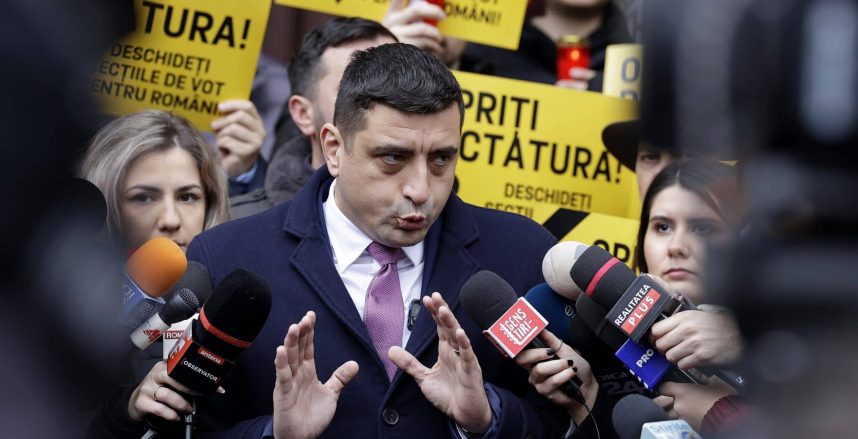
Romanians are worried about the state of their democracy after allegations of electoral manipulation results in a bombshell court decision to re-run the race for the presidency.
Overturning Calin Georgescu’s shock win, the court said the election had been marred by “manipulation” by a “foreign state” through the unlawful use of digital technologies and artificial intelligence. Romania’s intelligence agency had claimed paid influencers had boosted TikTok accounts promoting Georgescu and reported over 85,000 cyberattacks during the election, saying the scale, methods and level of coordination strongly suggested the involvement of a foreign state.
Georgescu ran as an independent with little mainstream media coverage and a campaign focused almost exclusively on TikTok, yet he defied opinion polls to come out on top with 23 per cent of the vote.
Had the Court not annulled the vote, Georgescu would have contested a run-off on November 8 with Elena Lasconi, leader of the centrist, pro-EU Save Romania Unity party. Had he won the presidency – which has oversight of foreign and defence policy – it would have thrown into doubt Romania’s continued support for Ukraine in its war against Russia and marked a significant shift in the country’s geopolitical trajectory.
It’s better that Georgescu is not president, said Zamfir, but the nature of his victory and its subsequent annulment raise serious questions about Romanian democracy and risk exacerbating societal divisions. His fears are shared by others.
Appearance of action

Seemingly stung by public criticism about a lack of response to the alleged electoral manipulation, prosecutors on Saturday raided several properties in the central city of Brasov, including the home of a man they alleged had illegally bankrolled Georgescu’s campaign – Bogdan Peschir.
“The searches are related to the possible involvement of a person in the illegal financing of the electoral campaign of a candidate for the presidency of Romania, through the use of sums of money for which there are indications they may be derived from the commission of crimes and subsequently introduced in a process of money laundering,” the General Prosecutor’s Office said in a statement.
According to declassified intelligence files released last week, Peschir provided roughly a million euros for Georgescu’s campaign, of which TikTok said it received 381,000 euros in the month prior to first round of the election.
Late on Sunday, police detained Horatiu Potra, a dual Romanian–French national, on suspicion of travelling – armed – to Bucharest to incite rallies in support of Georgescu. Media reports described Potra as leading a criminal, paramilitary organisation with ties to the far-right.
Prosecutors are also investigating several people who recently participated in commemorative events for an interwar fascist leader, in alleged violation of a law banning organisations and symbols of a fascist, racist or xenophobic nature. One person was detained.
The defence ministry also moved to quash claims on TikTok that Romania was moving military hardware and enlisting young people to fight in Ukraine.
But Sorin Ionita, director of the Bucharest-based think tank Expert Forum, said such actions could hardly make up for the authorities’ prior complacency.
“It is clear that the authorities are now attempting to justify the inaction of politicians and high-ranking security officials regarding the current situation,” Ionita told BIRN. “Their actions are based on the idea that Romania has faced an unprecedented hybrid attack”, he said, but such attacks have already been seen elsewhere, notably in neighbouring Moldova.
“What is truly unprecedented is the weakness of the institutions in responding to such attacks.”
‘A divided nation’

Manipulation aside, experts say the first round of the election underscored widespread public dissatisfaction with the political elite, which is perceived as corrupt and aloof.
Re-running the election won’t fix the underlying challenges.
It will take roughly 90 days to organise fresh elections, meaning Romania faces months of political uncertainty and the unprecedented prospect of incumbent President Klaus Iohannis having to stay on beyond the official end of his current term on December 21.
The timeline for the elections will be determined by the next government, which must emerge from a highly fragmented parliament elected just last days. Right-wing parties control around a third of the seats in the chamber.
“Simply cancelling the election won’t address the root cause, which cannot be overlooked: voter protest, along with the widespread disengagement and apathy among a significant portion of citizens,” said Ioan Stanomir, professor of constitutional law at Bucharest University.
“The truth is that Romania is now a divided nation, weakened by mediocrity and entrenched clientelism.”